Population Decline & Overshoot
Our population will decline, whether we like it or not. Just like climate change, the trends are already set in motion. So why not start preparing for it?
Last week I watched this episode with Jeremy Grantham on The Great Simplification podcast, and it made me think about population and collapse, reevaluating a few things.
My first thoughts are this: a declining population and shrinking consumption could be a blessing, if we actually plan for it and have a complete system change. If we don’t plan for it, it will be another disaster.
If you look at the chart below, all those lines need to come down. But since we're too delusional, stubborn, and ignorant to fix this voluntarily, when our population declines, the rest might follow. It’s probably too slow to save the planet, but it's something to think about.
Civilizations have always collapsed due to overshoot. They overuse essential resources like water, farmland, and forests, until they have nothing left to sustain them. Even relatively small climate shifts, such as droughts or cooling periods, were enough to bring empires down, because they disrupted water and food systems.
When the food and water are gone, it’s game over. That’s really all it takes.
“As a historian, you have to be conscious of the fact that every civilization that has ever existed has ultimately collapsed.”
-Henry Kissinger – Washington, October 6, 1974 (source)
Previously, when a civilization declined or collapsed, the population usually took a big hit, but not always. Some collapses, like the Mayans and Rapa Nui, experienced massive die-offs where people starved, died from disease, and killed each other. But the Romans were more of a slow decline where people shifted to rural living, because;
they had the skills to do it – most people today do not
that was still possible with a stable climate – we don’t have a stable climate anymore
Today, we are clearly in the midst of civilizational decline, at the same time as we face the fastest ever mass extinction event causing climate havoc, on an already heavily degraded planet from environmental destruction and pollution. This is a result of our overshoot from overpopulation and overconsumption.
Things actually started falling apart centuries ago for many western countries, but we managed to delay the inevitable by climbing even higher, ensuring a more catastrophic fall. The reason industrial civilization lasted this long is because we expanded our unsustainable practices around the world, by colonizing and stealing lands, while hitting the geological lottery with massive fossil fuel reserves: coal, oil, and natural gas.
We burned through those winnings in just a few generations, pushing food production, resource extraction, and population growth to levels never seen before, driving us deeper into overshoot.
However, compared to previous collapses, our civilization seems to be doing something different. Populations are already starting to decline in developed nations, but it’s not because we’re running out of food or water. In fact, people are fatter than ever, spending most of their lives trying to lose weight. Birth rates are actually dropping everywhere, with developed countries leading the decline, but even high-birth-rate countries have been declining for a long time.
There’s no reason to believe this trend will reverse. Despite pathetic government attempts to boost fertility rates, that’s simply one thing they can’t control (or maybe they will try to). I will get back to why fertility rates are dropping later in this article.
The fertility rate is the average number of children a woman has in her lifetime. A rate of 2.1 is called the replacement rate, meaning it’s enough to keep a steady population, accounting for child mortality. If the fertility rate drops below 2.1, the population starts to shrink over time, if it’s above 2.1, the population grows.
What happens if the fertility rate drops to 1? That means the population would be halved each generation. In just 50-60 years, the population could shrink by around 75%. That’s a pretty big deal.
We’ve never seen a population bust of this scale or speed in modern history, and the economic disruption ahead will be unlike anything we've experienced. So, what's the solution? More babies? That’s what a demographer or economist might suggest, but we all know it’s way more complicated than that. This is just one problem, and in fact, a shrinking population would help us tackle much bigger, existential issues.
Population trends and the reality we live in
South Korea is very interesting. It has a population of 51.6 million and a fertility rate of 0.73. This is the lowest fertility rate in the world.
Here are the forecasts up to the year 2050:
Two things to note here:
The forecast assumes fertility rates will recover back to 1.03 by 2050, which, while an improvement, is still well below replacement level. But the reality is that the fertility rate was 0.73 in 2024. Perhaps they are counting on immigration.
The model projects a median age of 56.7 by 2050, assuming people will continue to live long and healthy lives. This completely overlooks the realities of declining health, resource shortages, and the economic crisis that will hit older populations especially hard.
Even if the optimistic scenario holds, the population is expected to shrink to 45 million with a median age of 56.7. That’s already an unsustainable situation.
And this trend isn’t unique to South Korea. Nearly every country has already hit or is approaching the peak of population growth, and many are already in decline.
China is in big trouble, and that’s bad news for the global economy (good news for the planet). A lot of what we consume, from electronics to clothing to industrial goods, comes from China. If their economy crumbles, it will ripple through global supply chains, disrupt production and drive up prices.
Leaders are trying to save their economies by bringing in more immigrants, but that’s just a temporary fix, and there’s a lot of pushback against it. The reality is, immigration isn’t going to solve the bigger issues at play and in many cases, it’s making societies even more polarized.
By the way, I’m not against immigration, I’m an immigrant myself.
World population projections
The world population is currently around 8.2 billion and is projected to peak at about 10 billion by 2080, according to the average model. Typically it looks something like this:
Okay, great, that’s a lot of humans.
Below is a graph showing 70 year trends in fertility rates, and the global average.
This is 4 year old data, but the key takeaway is that fertility rates are declining in all countries, and globally we are barely above replacement rate (2.25 in 2024). Most developed countries have been under 2.1 for decades.
In my opinion, all of the official forecasts are bullshit. The people making these forecasts have fallen into the trap of reductionist thinking, which ignores how everything is interconnected and oversimplifies complex systems. To be fair, they’re working with unknowns that are nearly impossible to predict, but that doesn’t excuse their lack of nuance.
Avoiding the trap of reductionist thinking
The solutions that our experts and leaders push are more about wishful thinking than actual reality. For example, proposed solutions to climate change assume that the entire issue exists in a vacuum and everything else in our societies will just carry on as usual. They ignore the economic and geopolitical realities, as well as the accelerating depletion of critical resources and global warming disruption, assuming everything will stay exactly the same up until 2050, allowing them to execute their net-zero plans without disruption.
But we all know that’s nonsense, and it’s the kind of thinking that leads to ridiculous ideas like green growth, deploying 500 000 drones to counteract melting ice sheets, and building a massive wall to hold back the Antarctic glaciers.
Economists are some of the worst offenders when it comes to reductionist thinking. Much of mainstream economic theory is built on the assumption that energy, resources, and productivity will always be abundant, interchangeable, and available at a reasonable price. This framework ignores physical limits, treating resources as infinite and assumes endless population growth and consumption can continue indefinitely. It’s wishful thinking disguised as theory.
Unfortunately most leaders blindly follow these misguided ideas.
Take for example William Nordhaus1, who won the Nobel Prize in 2018 for his work on the economic impacts of climate change. His conclusions are laughable. Nordhaus argued that a 6°C rise in global temperatures would only reduce global GDP by about 8.5%. This is one of the most absurd things I’ve ever heard. At 6°C, we’re all pretty much dead. There is no economy.
Why did he come to such a conclusion? It’s all because of reductionist thinking. His model completely overlooks the chain reactions that would destroy agriculture, energy systems, supply chains, and pretty much everything else. It assumes the economy keeps chugging along while ecosystems collapse, food production tanks, and billions of people can’t live where they are. In reality, these shocks wouldn’t just shrink the economy, they’d tear society apart.
Long range forecasts
Most projections conveniently stop at 2100, often assuming higher fertility rates than the data suggests and showing a peak around 10 billion. But they almost never show what happens after that.
This study2 attempted to make some long range forecasts:
The lines reflect different fertility rate scenarios. We’re currently tracking the green line at 2.25, but it’s trending downward, and I suspect we would soon follow the red (1.75) or purple lines (1.5) on a global level if no other issues existed.
Taking an even longer perspective on population dynamics, this study showed what population overshoot could look like if current fertility trends continue:
Quite a spectacular fall. Reality could be ever worse.
Why fertility rates are declining
There are some obvious reasons, and some far more unsettling ones.
Ask young people today if they want kids, and many will say no. They don’t want kids. They can’t afford kids. They can’t get a job. They can’t even afford their own lives. They’re anxious about the future. For many, the idea of bringing a child into an increasingly uncertain world feels overwhelming and impractical. That’s unlikely to change as things get even worse.
Then there are those who want children but can’t have them. Decades of exposure to plastics, chemicals, and endocrine-disrupting substances have infiltrated our bodies, leading to a significant decline in fertility, not just in humans but other species too. It’s a quiet but brutal consequence of modern life, something we don’t notice much but are definitely feeling more and more.
If this trend continues, it’s actually within the realm of possibility that we (and other species) could become infertile within a few decades due to the plastics, chemicals, and other pollutants that have infiltrated our bodies. That of course means complete extinction.
But that’s only fertility. We will likely see a rapid increase in deaths too when food, water and livable climate become more scarce. So those projections regarding average life-spans are most certainly going to be off by quite a lot and our population could be dramatically lower in just a few decades.
What does all of this mean?
In isolation, it means economic contraction, which would have all sorts of consequences for society and could bring the entire system down. But we can't ignore the other crises piling up i.e. global warming, an impending energy crunch, escalating geopolitical tensions, biodiversity loss, and resource depletion (topsoil, fresh water, forest cover, metals, minerals, fossil fuels etc.).
But let’s indulge in some reductionist thinking for a moment.
Imagine a country with 10 million working-age people supporting 2.5 million retirees. That works. Now, imagine if the country only had 4 million working-age people and 8 million retirees. The system would likely collapse, and society would start to unravel. Most of our current pension systems are based on the idea that the workforce will keep growing to support an ever-expanding pool of retirees. A ponzi scheme that demands growth to function.
When the number of workers shrinks and the number of retirees rises, the adjustment will be tough. Pensions will have to be cut, retirement age pushed higher, and contributions will need to increase. People won’t like that, especially if they’ve been sold the fantasy of endless growth. Older generations will vote for whoever promises to keep pensions flowing, while younger generations will vote for the opposite.
Now, imagine a city of 10,000 people shrinking to 5,000. Services would shrink. Schools, healthcare, and businesses would close or scale back, adjusting to the smaller population. Government revenue would plummet, and infrastructure would fall into disrepair. Society would slowly start to disintegrate.
Apple won’t be selling as many iPhones, iPads, and MacBooks when the population shrinks, even if they roll out tons of robots. The same goes for every business. That means the stock market will either correct or implode, because it’s still pricing in growing future cash flows and consumption.
Of course, companies aren’t just going to sit back and take the hit. They’ll raise prices to maintain revenue and profit margins as long as they can. If their costs rise due to resource scarcity or climate change impacts, they’ll still add their usual 50% margin on top and pass it on. That’s what they’re designed to do, maximize shareholder value. To be honest, they really have no choice. It's either that, or go out of business. Take your pick.
But eventually, people will be priced out, and demand for non-essential goods will vanish. So even in a scenario where stocks keep rising with inflation, eventually the music stops, and it all comes crashing down.
Is this good news?
Like I said at the beginning, we need to get ALL of the lines down and we need to do it fast.
Our population will decline, whether we like it or not. For that to be a good thing, we need a complete system change. This is not about making small adjustments to the current system. That won’t cut it. I’m talking about radical transformation of society, one where we rethink everything from our economic models to our relationship with nature.
Fewer people would mean less consumption overall, which would cut down emissions and ease the pressure on climate change and slow down environmental damage. With less demand for energy, metals, and raw materials, we’d have fewer mines, factories, and supply chains polluting the land, air, and water.
This could delay the worst impacts from climate change, opening the door to regenerative practices, where we focus on healing and restoring ecosystems instead of exploiting them. If we shift away from extracting resources and move toward regenerative farming, we could help restore the land, trap carbon, and build stronger, more resilient communities.
Do I think that’s likely to happen? No. But it’s possible, so I can’t completely rule it out. I’d put the chances at under 1%.
If we keep ignoring the coming population bust, or avoid discussing it openly, then yes, it will be a disaster. But it’s going to happen either way. Just like climate change, the trends are already set in motion. So why not start preparing for it?
https://www.nobelprize.org/prizes/economic-sciences/2018/nordhaus/facts/




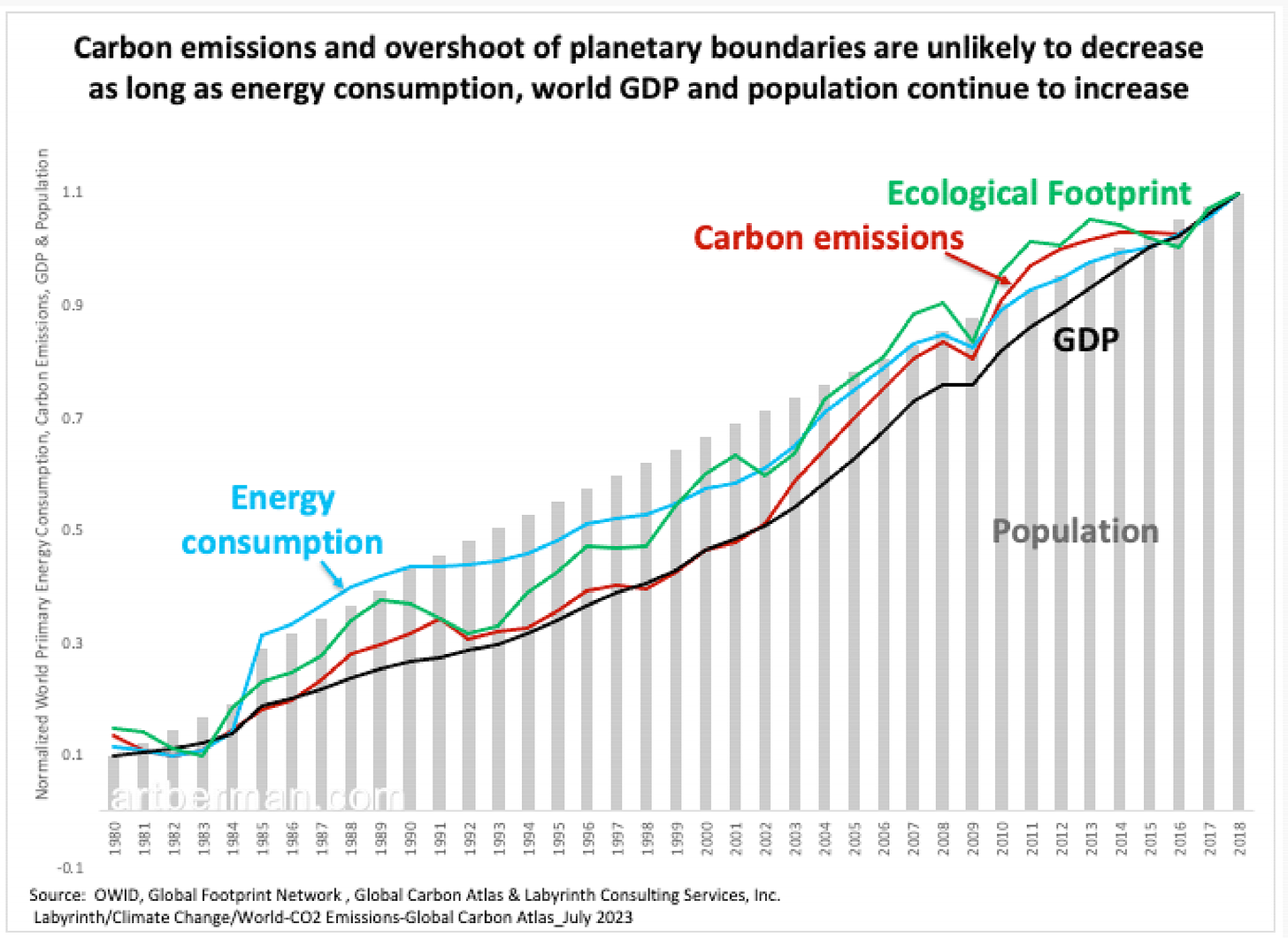
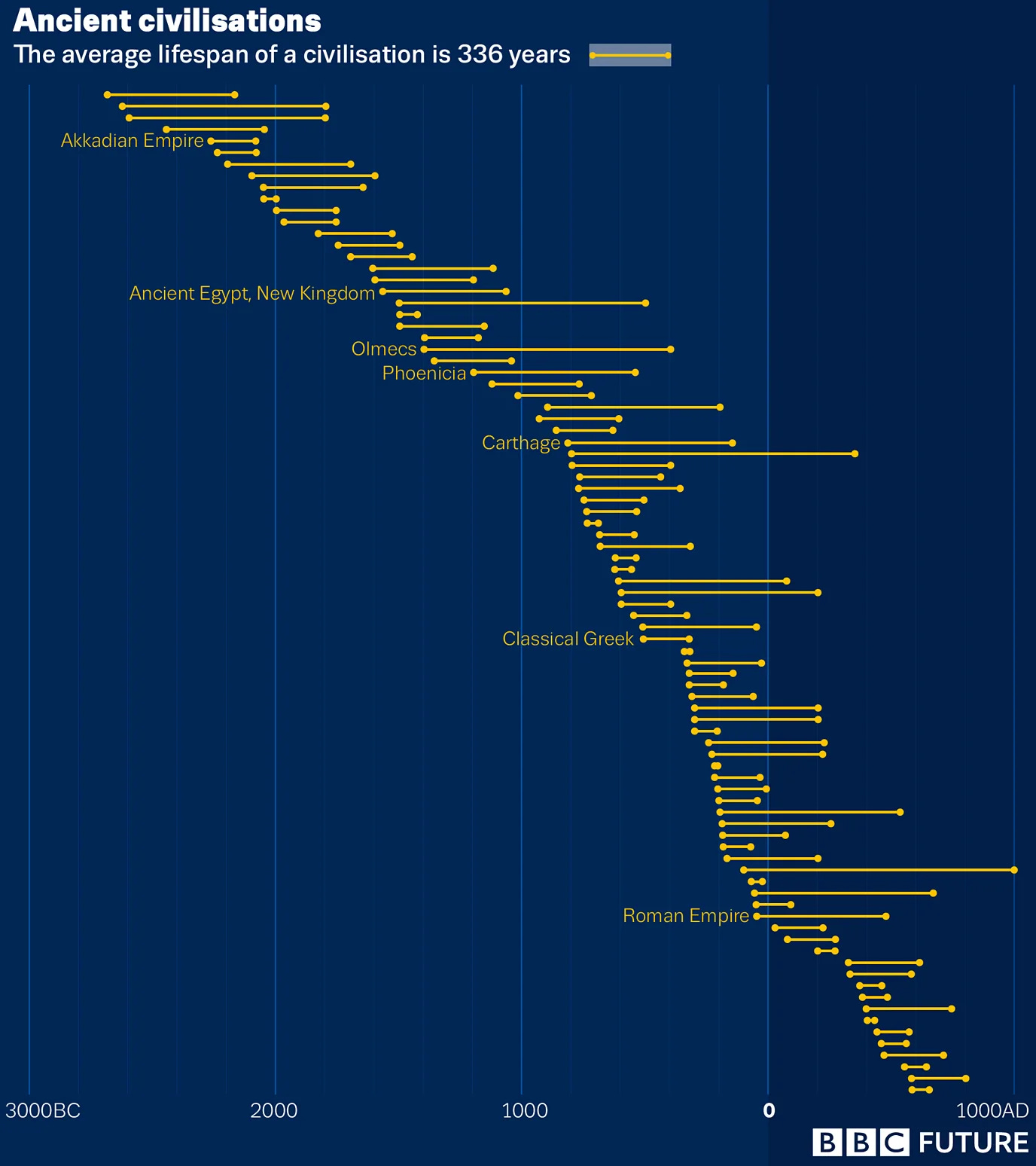
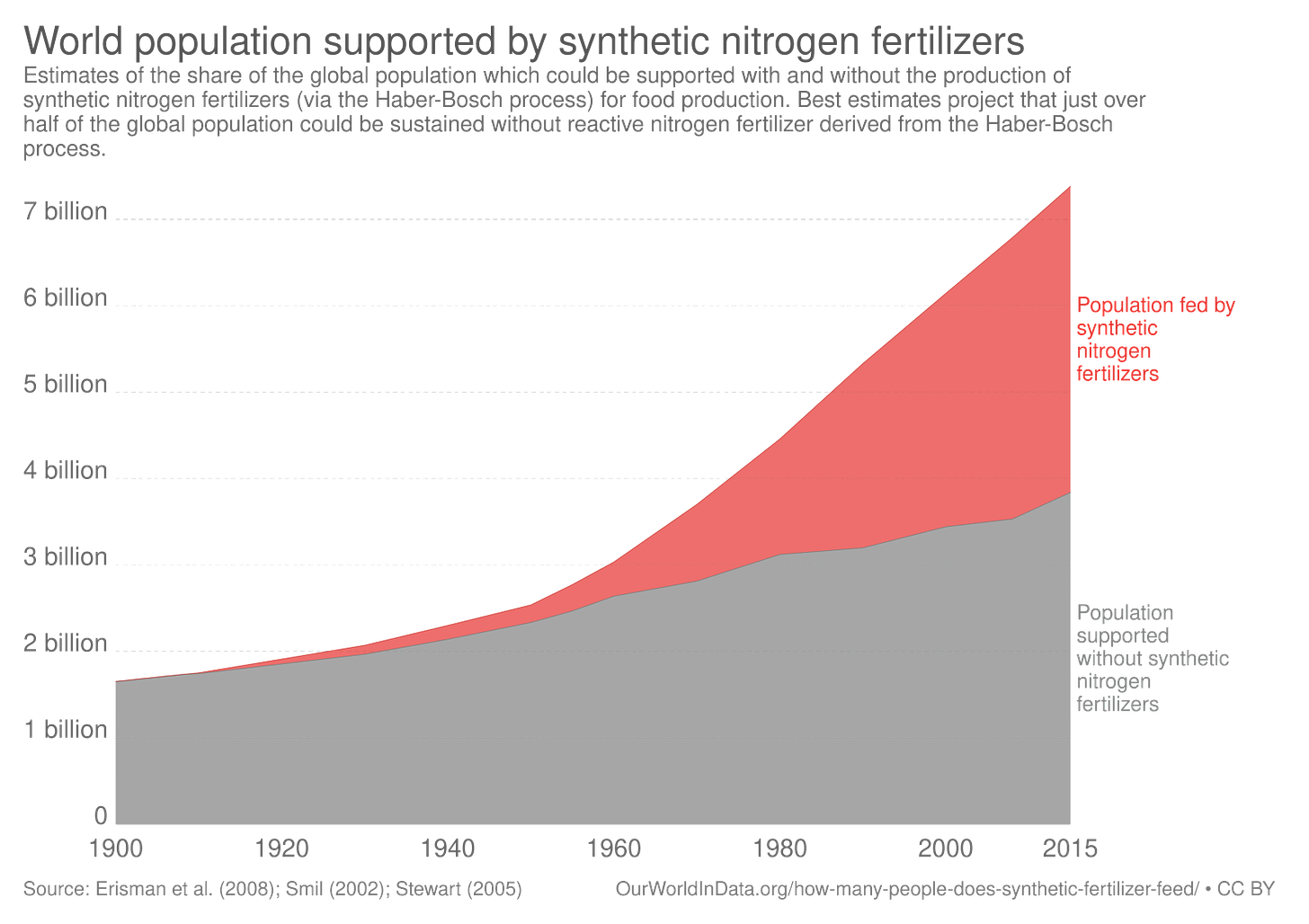

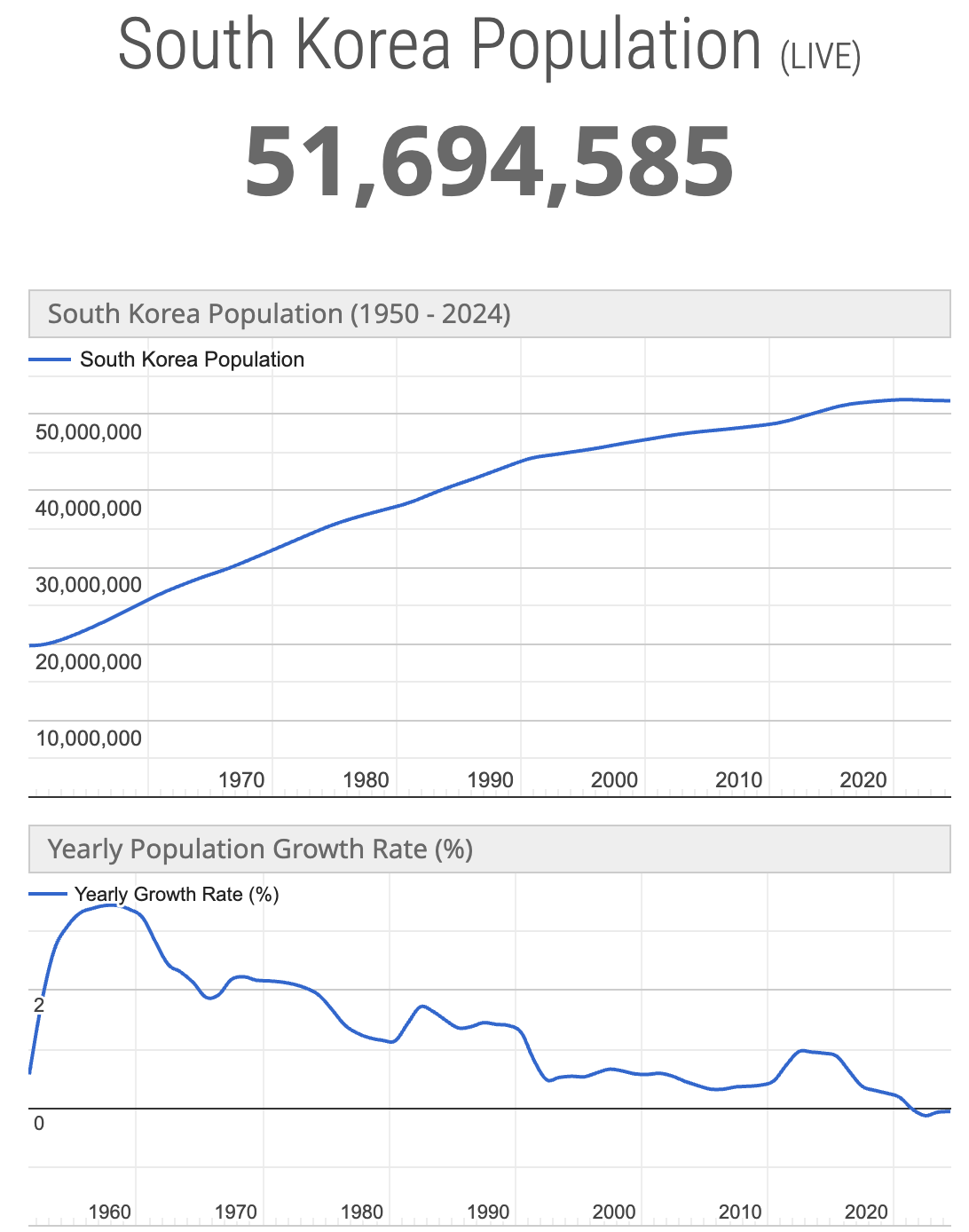

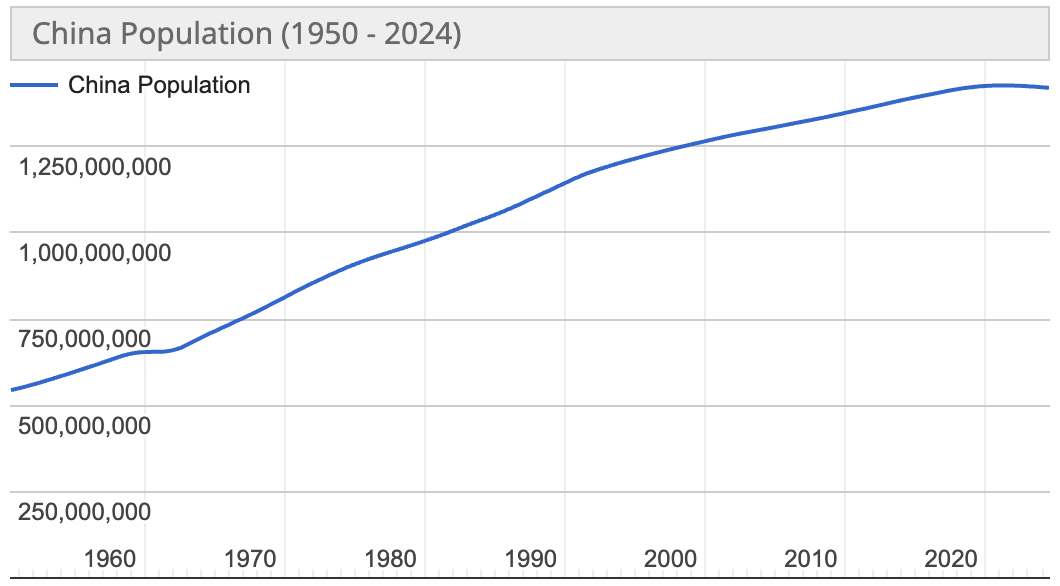
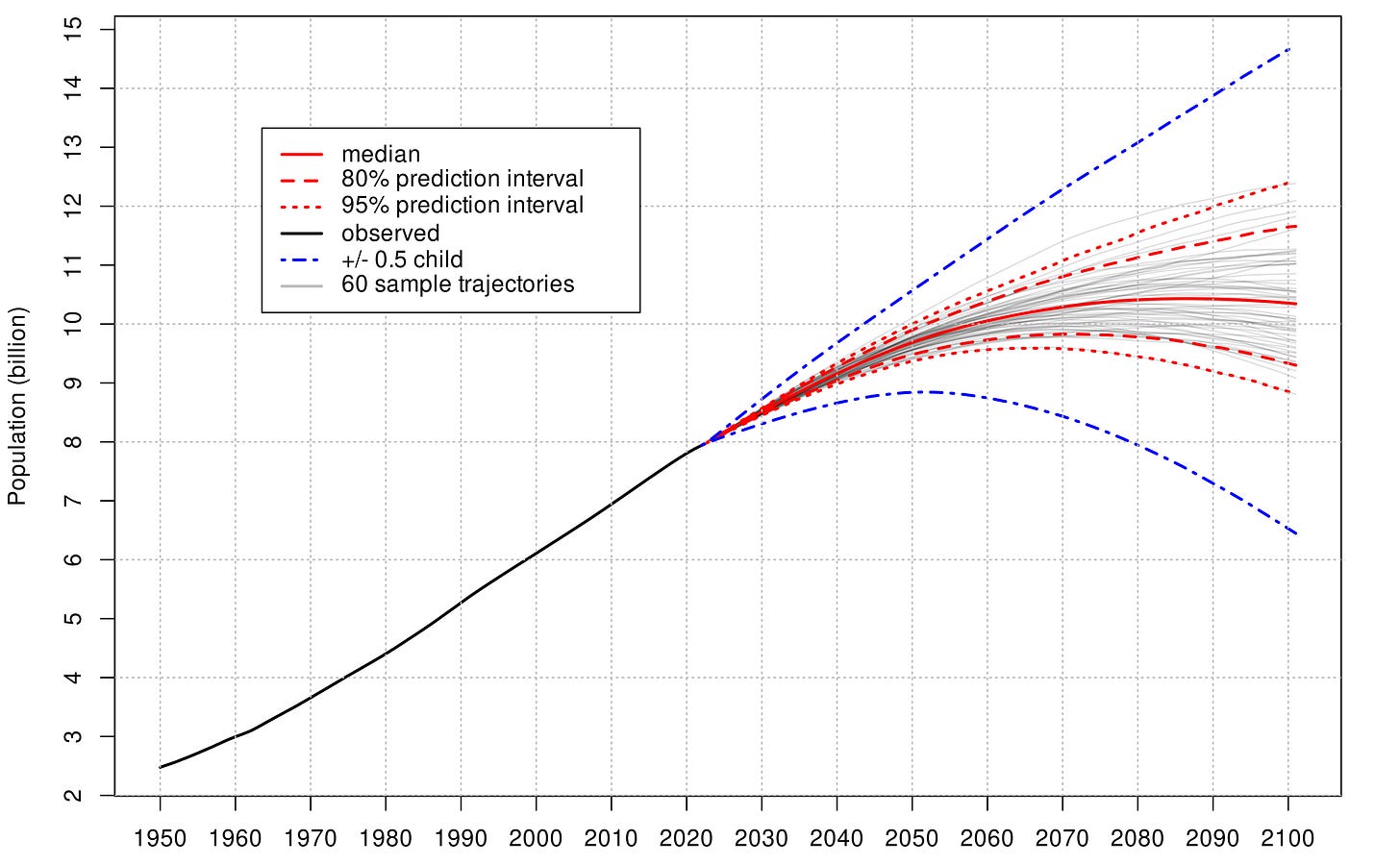
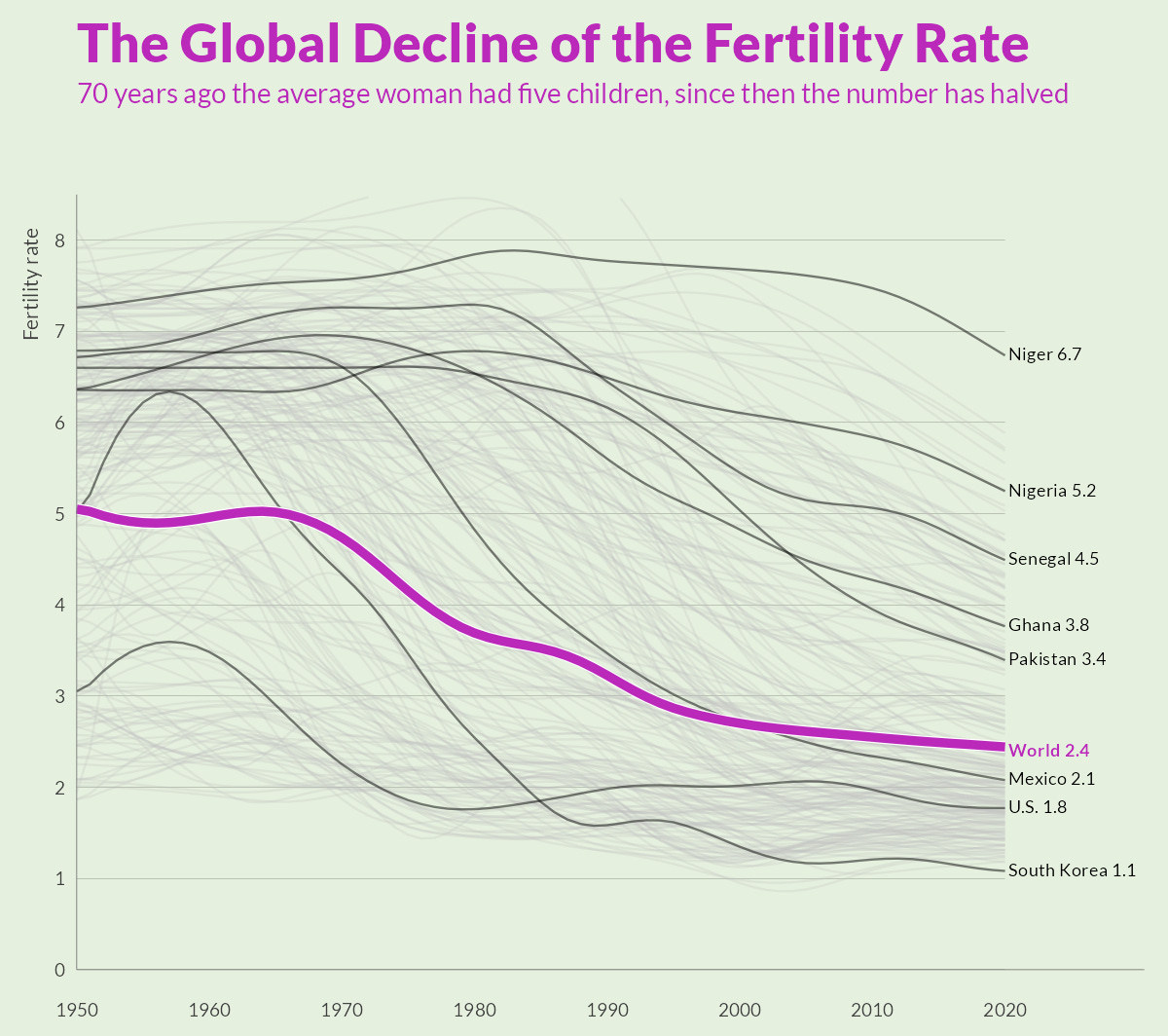
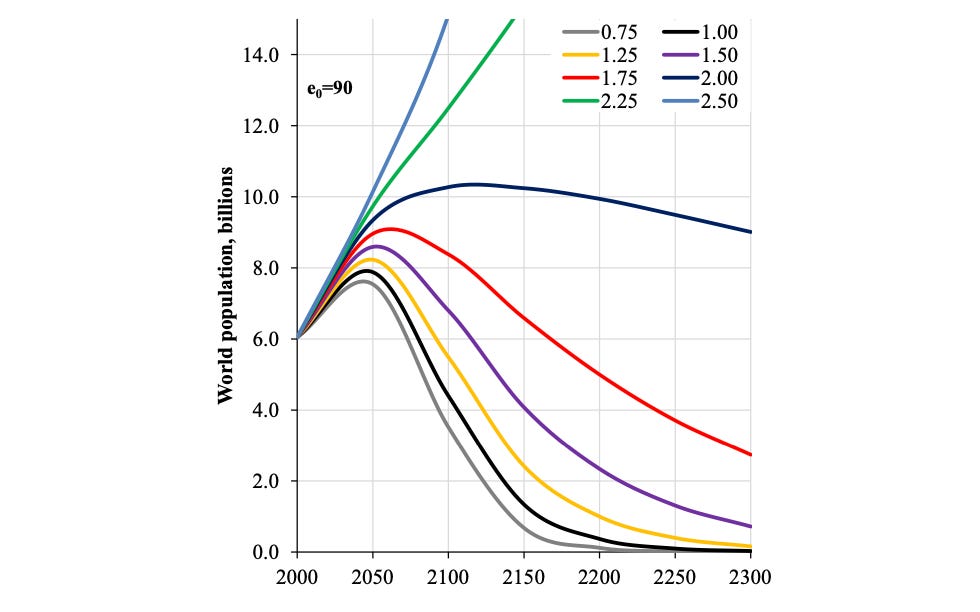
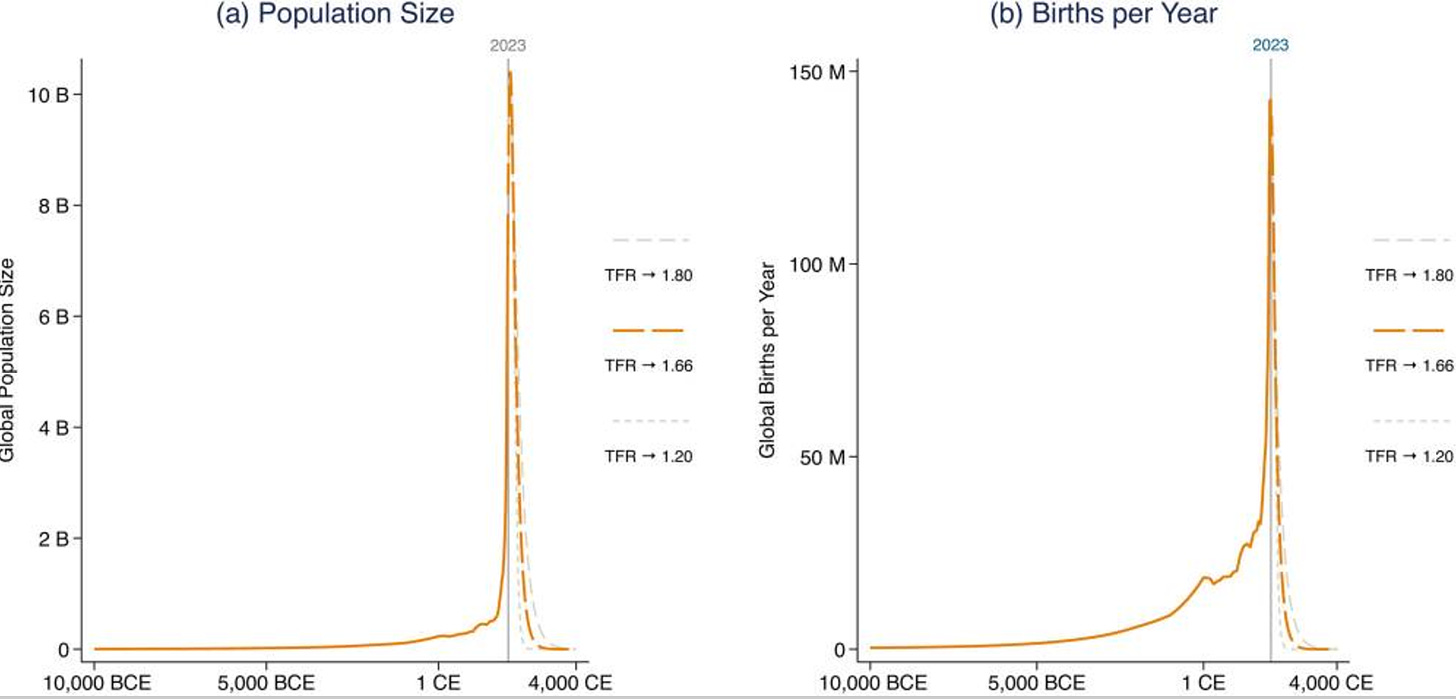
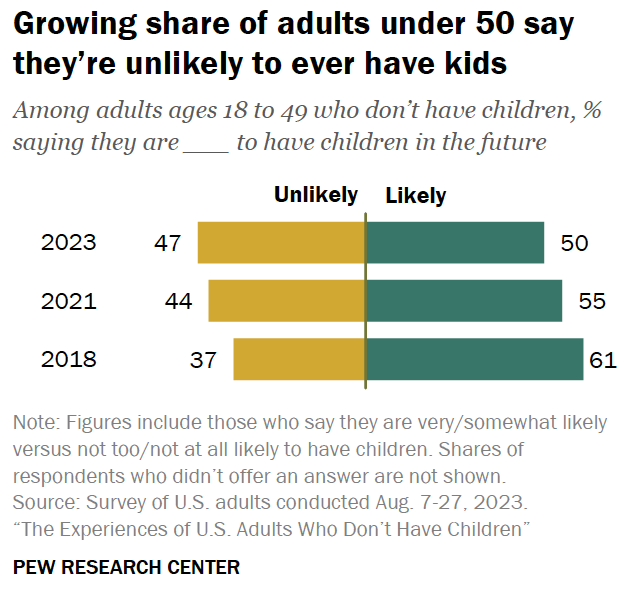
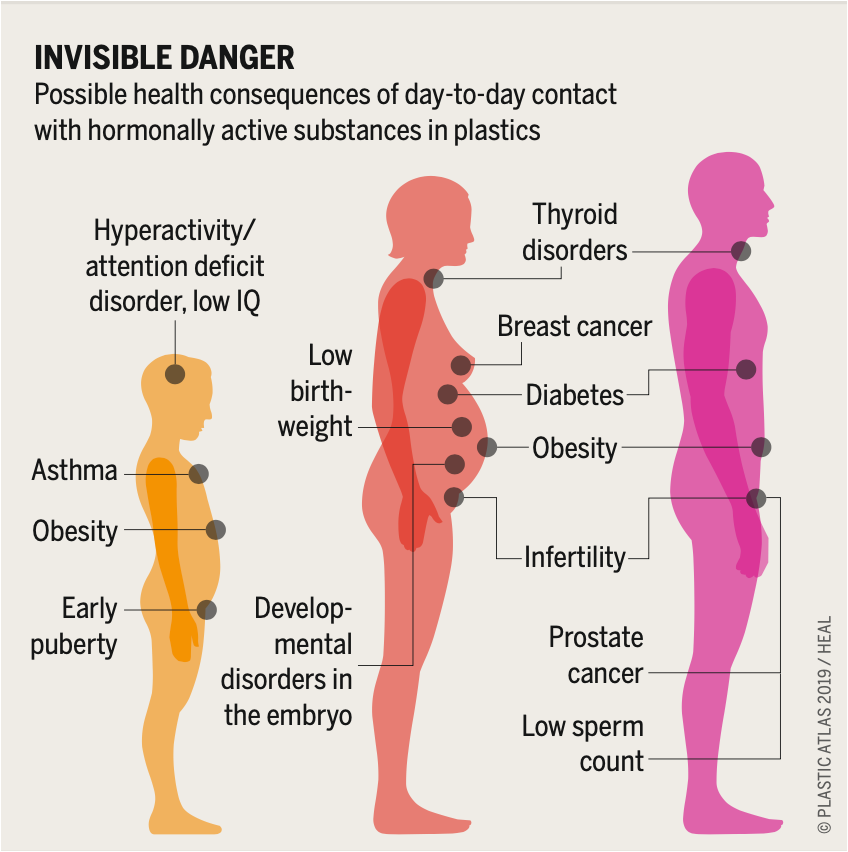
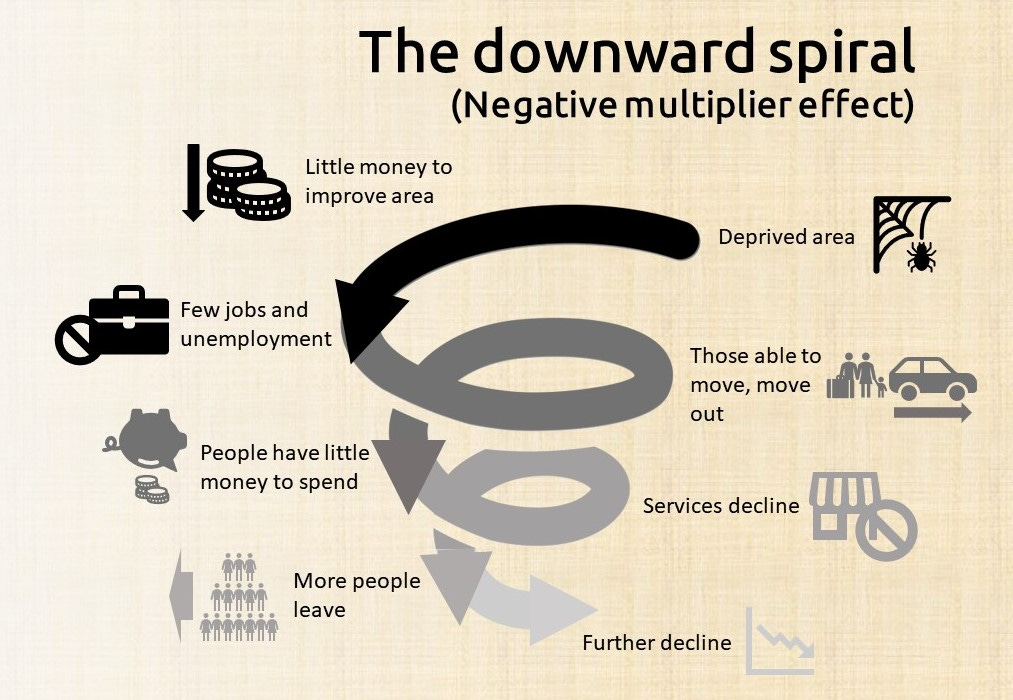
Probably the single best post I've seen here on substack or anywhere else so far, except, of course, my 2018 book, "Stress R Us", wherein the term "population density stress" is created and explained. We are now 3,000 times more populous than were our ancestral migratory Hunter-Gatherer/pastoralist clans/bands just a few thousand years ago, which have been vanishing in the massive population explosion due to our discovery and development of new energy sources, beginning with sedentary farmed grain crops. We evolved from ancestors long the result of selective pressures on clan/band living, which have been "overshot" by the chaotic diasporas and lifeway disruptions we see today. After a lifetime spent as a psychiatrist/addictionist/physician/stress researcher/recovered alcoholic-addict, I have had the honor (?) of watching the "overshoot" effect on our human psyches and, eventually, sought to distill my observations in an online/PB book, which can be found as a free e-book by Googling "Stress R Us" for the PDF out at Stanford, or forking out $25. for the PB on Amazon.
Many thanks to this author for his/her fine anonymous contribution to "overshoot", with this very well written and illustrated piece. At this very late stage in our species' evolution, the Seneca Curve downslope is well underway, as current political/corporate developments can clearly reveal to anyone willing to look at the truth for what it actually is. Most will/do choose to remain in a mad dash to the edge of and over the edge of the cliff of societal collapse in the midst of an undeniable climate collapse. On that cheery note, this old doc wishes one and all a very HAPPY HOLIDAY!
I liked your final comment, that we probably aren’t going to get round to avoiding a crash landing, and you put the odds at less than one percent … hopeful! We can, indeed, never say never. Miracles *do* happen …